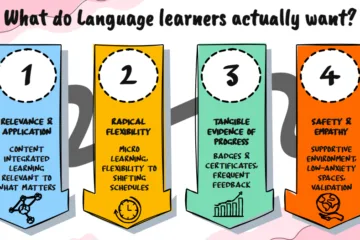Why “I Have a Good News” Can Undermine Your Professional Credibility
When your sales team announces quarterly results to international clients, or your project manager updates stakeholders on deliverable progress, these moments of professional communication can make or break business relationships. A single grammatical error—particularly one that sounds awkward to native English speakers—can inadvertently signal inexperience and undermine your team’s credibility.
Consider this seemingly innocent sentence: “I have a good news about our project timeline.”
To non-native speakers, this construction appears perfectly logical. You’re announcing positive information using familiar grammatical patterns. However, to native English speakers, this phrasing immediately signals non-native proficiency and can distract from your message’s content.
Understanding why this common mistake occurs—and how to avoid similar errors—proves crucial for teams who need to communicate confidently in international business environments. The difference between “I have good news” and “I have a good news” might seem trivial, but in professional contexts, these nuances significantly impact how colleagues, clients, and partners perceive your expertise.
Understanding Mass Nouns in Professional Communication
The word “news” belongs to a special category called mass nouns (also known as uncountable nouns), which represent concepts that cannot be easily quantified or divided into discrete units. Unlike regular count nouns that can be singular or plural, mass nouns maintain consistent grammatical treatment regardless of the quantity they represent.
This grammatical distinction proves particularly important in business English, where precision and clarity drive effective communication. When your team discusses “market research,” “financial data,” or “customer feedback,” they’re working with mass nouns that follow specific patterns native speakers intuitively recognise.
Mass nouns typically represent abstract concepts, substances, or collective phenomena that don’t naturally divide into countable units. Consider these common business examples:
- Information: “The information is valuable” (not “an information”)
- Equipment: “Our equipment needs updating” (not “an equipment”)
- Research: “Market research shows positive trends” (not “a research”)
- Training: “Staff training improves productivity” (not “a training”)
- Progress: “Project progress exceeds expectations” (not “a progress”)
At The Chat Laboratory, our professional tutors help corporate teams master these subtle but crucial distinctions through practical business scenarios. Rather than memorising abstract grammar rules, employees learn through authentic workplace contexts where mass noun usage directly impacts communication effectiveness.
The Challenge of Plurale Tantum in International Business
English contains numerous words that appear plural but function grammatically as singular entities. These “plurale tantum” nouns create particular challenges for international business teams because their apparent plural form contradicts their singular grammatical behaviour.
Common business-relevant plurale tantum examples include:
- Logistics: “Logistics is our primary concern” (not “logistics are”)
- Economics: “Economics influences our market strategy” (not “economics influence”)
- Statistics: “Statistics shows promising growth” (not “statistics show”)
- Headquarters: “Headquarters has approved the budget” (not “headquarters have”)
- Series: “The training series begins next month” (not “training series begin”)
Understanding these patterns prevents the awkward constructions that can undermine professional presentations, client communications, and stakeholder updates. When your German engineering team confidently states, “The data shows significant improvement,” rather than struggling with “The data show,” they project competence and attention to detail.
Our tailored corporate training programmes at The Chat Laboratory focus extensively on these practical applications. Teams practice using plurale tantum nouns in realistic business scenarios—budget presentations, progress reports, strategic planning discussions—where grammatical accuracy directly supports professional credibility.
Singulare Tantum: The Opposite Challenge
While plurale tantum nouns appear plural but act singular, singulare tantum nouns exist only in singular form and cannot be pluralised using standard patterns. These words present different challenges for international business communication.
Key business-relevant singulare tantum examples include:
- Advice: “Management advice is invaluable” (not “advices”)
- Guidance: “Strategic guidance helps teams succeed” (not “guidances”)
- Feedback: “Customer feedback drives improvement” (not “feedbacks”)
- Software: “New software increases efficiency” (not “softwares”)
- Machinery: “Production machinery requires maintenance” (not “machineries”)
These distinctions matter enormously in professional writing and presentations. When your marketing team writes, “We appreciate client feedback on our services,” they demonstrate sophisticated English usage. When they write, “We appreciate client feedbacks,” they inadvertently signal non-native proficiency.
The business implications extend beyond grammar correctness to perception management. Clients, partners, and colleagues unconsciously evaluate language competence as an indicator of professional reliability and attention to detail. Mastering these subtle distinctions enhances your team’s credibility across all international business interactions.
Practical Strategies for Quantity Expression with Mass Nouns
Since mass nouns cannot accept indefinite articles directly, business communicators need alternative strategies for expressing quantity, specificity, and emphasis. These alternatives allow precise communication whilst maintaining grammatical accuracy.
Instead of “I have a good news,” use:
- “I have some good news” (indefinite quantity)
- “I have excellent news” (quality emphasis)
- “I have important news to share” (significance emphasis)
- “I have a piece of good news” (single item specification)
- “I have several pieces of good news” (multiple item specification)
For other common business mass nouns:
- Information: “a piece of information,” “valuable information,” “detailed information”
- Research: “extensive research,” “market research findings,” “a research study”
- Equipment: “new equipment,” “specialised equipment,” “a piece of equipment”
- Training: “comprehensive training,” “skills training,” “a training programme”
- Progress: “significant progress,” “steady progress,” “measurable progress”
These patterns provide flexibility whilst maintaining native-like accuracy. Teams can express precise meanings without falling into the grammatical traps that characterise non-native English usage.
Through our Microsoft Teams-based training sessions, The Chat Laboratory helps corporate teams internalise these patterns through repeated practice in authentic business contexts. Rather than memorising rules, employees develop intuitive understanding of natural English expression patterns.
Regional Variations in Mass Noun Usage
Different English-speaking business cultures sometimes treat certain mass nouns differently, creating additional complexity for international teams. Understanding these variations prevents confusion during cross-regional business communications.
American English occasionally treats some mass nouns as count nouns in specific business contexts:
- “Accommodations” (American) vs. “Accommodation” (British) for business travel
- “Trainings” (sometimes acceptable in American corporate contexts) vs. “Training programmes” (preferred British usage)
- “Researches” (occasionally used in American academic business contexts) vs. “Research studies” (standard British usage)
These regional differences require awareness rather than strict adherence to single patterns. The key lies in understanding your primary business audience and adapting communication style accordingly whilst maintaining fundamental grammatical accuracy.
For multinational corporations, developing awareness of these variations helps teams communicate effectively with diverse stakeholders. Your British client might expect “accommodation arrangements,” whilst your American partner discusses “accommodation options.”
Technology and Modern Business Communication Challenges
Digital communication platforms have intensified the importance of grammatical accuracy in business English. Email, instant messaging, video conferencing, and collaborative platforms create permanent records of language usage that colleagues and clients review repeatedly.
Unlike face-to-face conversations where grammatical errors disappear immediately, written digital communications preserve mistakes indefinitely. “I have a good news about the project” in an email to international stakeholders creates lasting negative impressions that affect professional relationships.
Social media and professional networking platforms further amplify these challenges. LinkedIn posts, Twitter updates, and company blog articles reach vast audiences and require impeccable English usage to maintain professional credibility.
Our corporate training programmes address these modern realities by focusing extensively on digital communication patterns. Teams practice composing emails, instant messages, and social media content that demonstrates sophisticated English usage whilst maintaining efficiency and clarity.
Building Systematic Grammar Awareness Through Business Context
Rather than approaching grammar as abstract rule memorisation, effective corporate language training integrates grammatical accuracy with practical business communication needs. Teams develop sophisticated usage patterns through repeated exposure to authentic workplace scenarios.
The Chat Laboratory’s methodology connects grammatical concepts directly to business outcomes. When employees understand how mass noun usage affects client perception, they become motivated to master these distinctions. When they recognise how plurale tantum mistakes undermine presentation effectiveness, they invest effort in developing accurate usage patterns.
This contextualised approach proves more effective than traditional grammar instruction because it addresses the real-world consequences of language choices. Teams see immediate relevance and apply new patterns consistently across all professional communications.
Transforming Professional Communication Through Grammatical Precision
Mastering subtle grammatical distinctions like mass noun usage represents far more than academic correctness. For international business teams, these skills directly impact professional credibility, client relationships, and career advancement opportunities.
The difference between “I have good news” and “I have a good news” might seem minimal, but in professional contexts, these nuances accumulate to create overall impressions of competence and reliability. Teams that consistently demonstrate sophisticated English usage project confidence and expertise that enhances business outcomes.
Understanding mass nouns, plurale tantum, and quantity expression strategies provides the foundation for more advanced business English capabilities. As teams master these fundamentals, they develop the linguistic confidence necessary for complex negotiations, strategic presentations, and international relationship building.
Ready to eliminate grammatical uncertainties that might undermine your team’s professional credibility? Contact The Chat Laboratory to discover how our business-focused English training builds the sophisticated language skills your teams need for international success. Our professional tutors specialise in the practical grammar applications that directly impact business communication effectiveness. Let’s ensure your team communicates with the precision and confidence that global business demands.



0 Comments